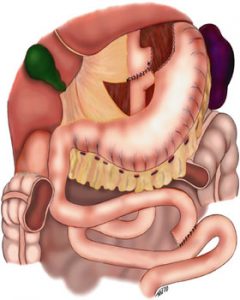Does The Risk Of Suicide Increase After Gastric Bypass Surgery?
A recent study involving a large group of people who underwent a gastric bypass found the risk for self-harm emergencies rose after surgery. The results of the study were published in the online edition of JAMA Surgery.
The Study
 Morbid obesity is an epidemic in rich countries; approximately 6% of people in America are classified as morbidly obese. With obesity, many individuals face mental health problems and it’s the same for people who undergo gastric bypass surgery. Self-harming behaviors, including suicidal ideation and previous suicide attempts are a common occurrence in bariatric surgery candidates. It’s not certain though, whether these behaviors are mitigated or aggravated by surgery, according to background information in the article.
Morbid obesity is an epidemic in rich countries; approximately 6% of people in America are classified as morbidly obese. With obesity, many individuals face mental health problems and it’s the same for people who undergo gastric bypass surgery. Self-harming behaviors, including suicidal ideation and previous suicide attempts are a common occurrence in bariatric surgery candidates. It’s not certain though, whether these behaviors are mitigated or aggravated by surgery, according to background information in the article.
Junaid A. Bhatti, PhD of the Sunnybrook Research Institute in Toronto, and his colleagues studied 8,815 adults from Ontario, Canada, who went through gastric bypass to compare the risks of self-harming behavior prior to and after surgery. The team categorized 4 distinct mechanisms of self-harming behaviors: medications, poisoning by toxic substances, alcohol and physical trauma.
A total of 111 patients had 158 incidences of self-harm during follow up. The team writes that even though a few patients had self-harm emergencies, the risk of these incidences increased by approximately 50 percent after surgery. Nearly all of these events happened in patients who had a previous history of mental illness. Intentional self-poisoning through drugs was the most common way participants had attempted suicide.
The authors of the study write the published literature gives differing reasons for the association between gastric bypass surgery and the increased risk of self-harm, including changes in alcohol metabolism after surgery; surgery may lead to a substitution of substance misuse for food; and increased stress and anxiety. The team states, “Findings from this study advocate a better understanding of these and other theories through future research of potential mechanisms of self-harm in patients undergoing bariatric surgery.”
The study has resulted in two important findings. First the pre-op incidence of self-harm emergencies in people going through the surgery is twice the population average and it increases by an additional 50 percent in the post-op period. The identification of patients with an increased risk of such adverse outcomes, remains elusive.
Secondly, self-harm emergencies happen in the second and third post-op years. Right now, there is no minimum standard for psychological follow up. Although strict criteria is in place for insurance and programmatic approval to go through surgery, the postoperative follow up rates have been poor.
Conclusion:
The study by Dr. Bhatti and his colleagues underscores the unique vulnerability of people who are going through or have gone through gastric bypass surgery. The information obtained makes medical professionals look more closely at why suicide rates are more than four times higher in these patients than the general population. Gastric bypass is more than just a weight-loss surgery and it is time it’s recognized and treated with more seriousness.
 Eating Disorder Self Test. Take the EAT-26 self test to see if you might have eating disorder symptoms that might require professional evaluation. All answers are confidential.
Eating Disorder Self Test. Take the EAT-26 self test to see if you might have eating disorder symptoms that might require professional evaluation. All answers are confidential.